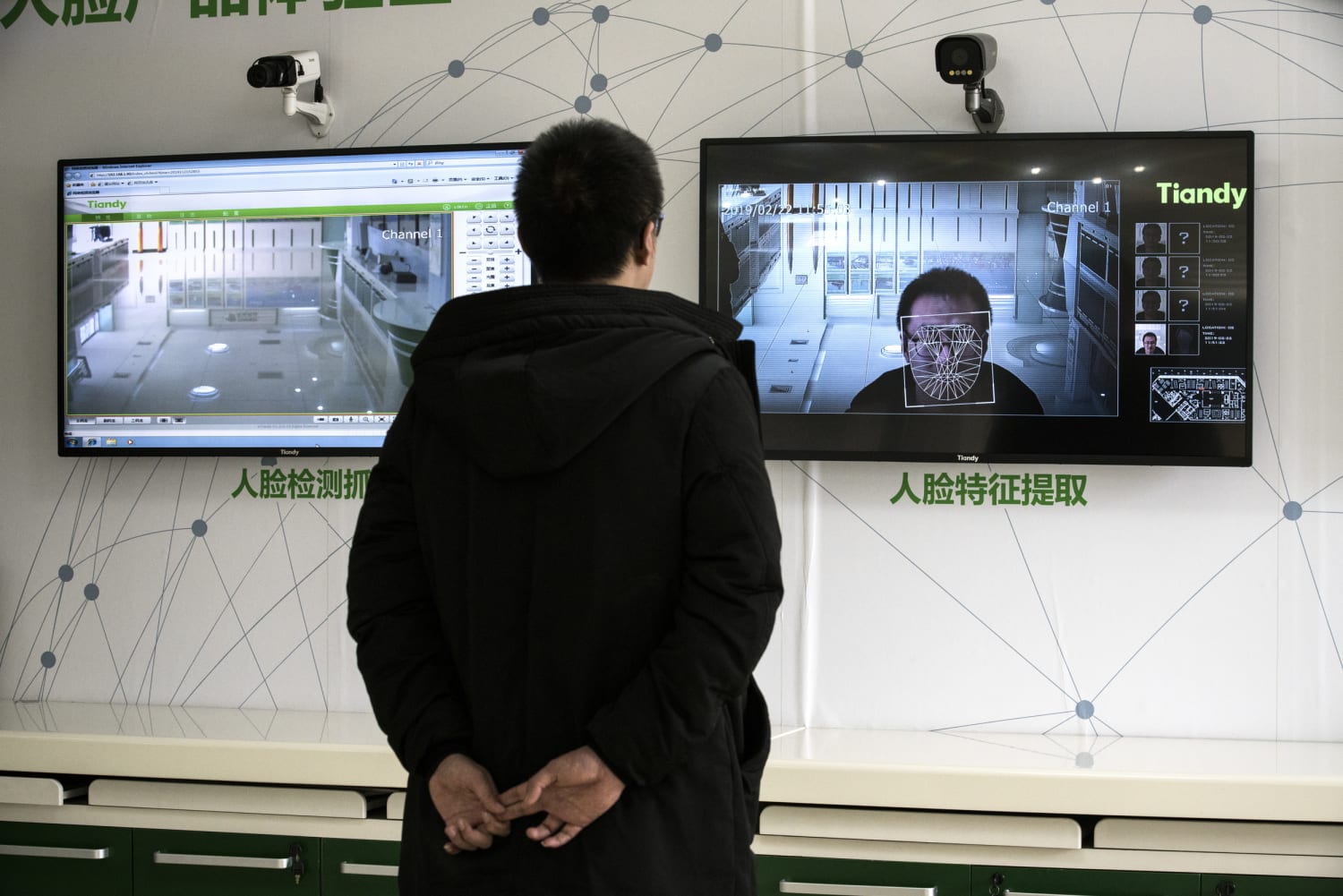The Biden administration on Thursday blacklisted a Chinese video surveillance company that officials say is implicated in the repression of Uyghurs in China and that provided U.S.-made technology to Iran’s Revolutionary Guards Corps.
The blacklisted firm, Tiandy Technologies, has touted its facial recognition software as designed to help Chinese authorities identify Uyghurs or other ethnic minorities, as well as “smart” interrogation tables, NBC News previously reported.
The Commerce Department sanctions against Tiandy restrict U.S. firms from exporting components to the company.
California-based semiconductor giant Intel Corp. has provided processors for Tiandy’s networked video recording systems. But before the sanctions decision was announced, Intel Corp. removed references to Tiandy from its website.
Intel Corp. spokesperson Penny Bruce told NBC News on Thursday that the company “ceased doing business with Tiandy following an internal review.”
Tiandy Technologies did not respond to a request for comment.
Losing Intel’s business marks a potentially serious setback for Tiandy, a privately owned firm based in the northern city of Tianjin, which ranks among the top video surveillance companies in China and the world. The company had annual sales revenue of more than $800 million in 2021, according to an industry survey, and the firm says it has branches in more than 60 countries.
NBC News reported earlier this month that Republican Sen. Marco Rubio of Florida urged the Biden administration in a letter to review Tiandy’s operations and consider whether the firm should be sanctioned under U.S. laws, citing the company’s activities in China and Iran.
On Thursday, Rubio called the imposition of sanctions “the right thing to do” but said more action was needed.
“The Chinese Communist Party is weaponizing technology companies to further its geopolitical goals,” Rubio said in an email. “The Department of Commerce needs to be more aggressive in using all available tools to identify and punish bad actors.”
In announcing the sanctions, the Commerce Department said Tiandy “has been implicated in human rights violations and abuses in the implementation of China’s campaign of repression, mass arbitrary detention, and high-technology surveillance against Uyghurs, Kazakhs, and other members of Muslim minority groups in the Xinjiang Uyghur Autonomous Region.”
By selling products that include U.S.-made parts, the company enabled Iran’s Islamic Revolutionary Guard Corps to acquire U.S.-manufactured technology, which is prohibited under U.S. sanctions, according to the Commerce Department.
Human rights advocates and lawmakers are concerned Iranian authorities could use Tiandy’s video surveillance technology to help squelch a wave of anti-regime protests in the country.
It remains unclear how Iran is using Tiandy’s technology, precisely what equipment Tiandy is providing and how the company may be advising the government on its use. But experts say the Iranian government has sought to emulate China’s use of digital technology to tighten its grip and counter critics and dissent.
Tiandy was one of 36 companies and organizations added on Thursday to the Commerce Department’s “entity list,” which blacklists firms engaged in activity deemed contrary to U.S. national security interests.
Tiandy has posted about the company’s “interrogation table” for Chinese authorities that offers “one-click interrogation” and transcript “proofreading,” which it says “greatly improves the efficiency of interrogation.”
The company also has posted photos of the interrogation table in front of “tiger chairs,” which have leg irons and handcuffs. Human Rights Watch, citing accounts from former detainees, has accused Chinese police of strapping Uyghurs into the chairs for hours and even days to immobilize them during interrogations. China has denied the allegations.
A U.S.-based security industry research firm and trade publication, the Internet Protocol Video Market (IPVM), first reported Tiandy’s work with Iran in 2021, including its five-year contract with the government.
“Today’s Commerce Department sanctions on Tiandy are not a surprise given its role in rights abuses. This is a company that trained computers to detect Uyghurs, and offers PRC (People’s Republic of China) authorities ‘smart’ interrogation solutions integrated with torture devices,” said Conor Healy, director of government research at IPVM.
Craig Singleton, senior China fellow at the Foundation for Defense of Democracies think tank, who wrote a report about Tiandy earlier this month, said the blacklisting of the firm “sends a clear message that Washington takes Chinese techno-authoritarianism seriously and will hold accountable those who facilitate Beijing’s human rights atrocities.”
He added, “For far too long, Chinese companies supporting China’s surveillance state have operated with near impunity.”
Under the blacklisting by the Commerce Department, a U.S. firm now would have to obtain a special license to export products to Tiandy.
But Tiandy and other Chinese tech companies could face tougher sanctions under a bill proposed Thursday by Sen. Rubio and Republican Rep. August Pfluger of Texas.
The bill mandates that the executive branch report details about individuals and entities involved in carrying out human rights abuses in China, and that President Joe Biden impose property-blocking sanctions and visa-blocking sanctions against violators.
The U.S. already has imposed numerous sanctions on other Chinese tech companies and has accused telecom giant Huawei and other firms of exporting technology abroad that could be used as tools for domestic surveillance, including in Iran.
Huawei has rejected the accusations.
The Biden administration last month effectively banned the sale or import of new equipment from a number of Chinese surveillance firms.
China has strongly rejected U.S. criticism of Chinese tech companies and of its treatment of Uyghurs or other Muslim minorities in the country.
Last month, a spokesperson for the Chinese embassy in Washington, Liu Pengyu, told NBC News that the embassy could not speak on behalf of Chinese private companies. But he said it was “absurd” to portray Chinese technology as a security threat.
“As we all know, harnessing modern scientific and technological development, like using big data and camera surveillance, to improve social governance is a common practice of the international community, and the United States is no exception,” the spokesperson said.
Source: | This article originally belongs to Nbcnews.com











